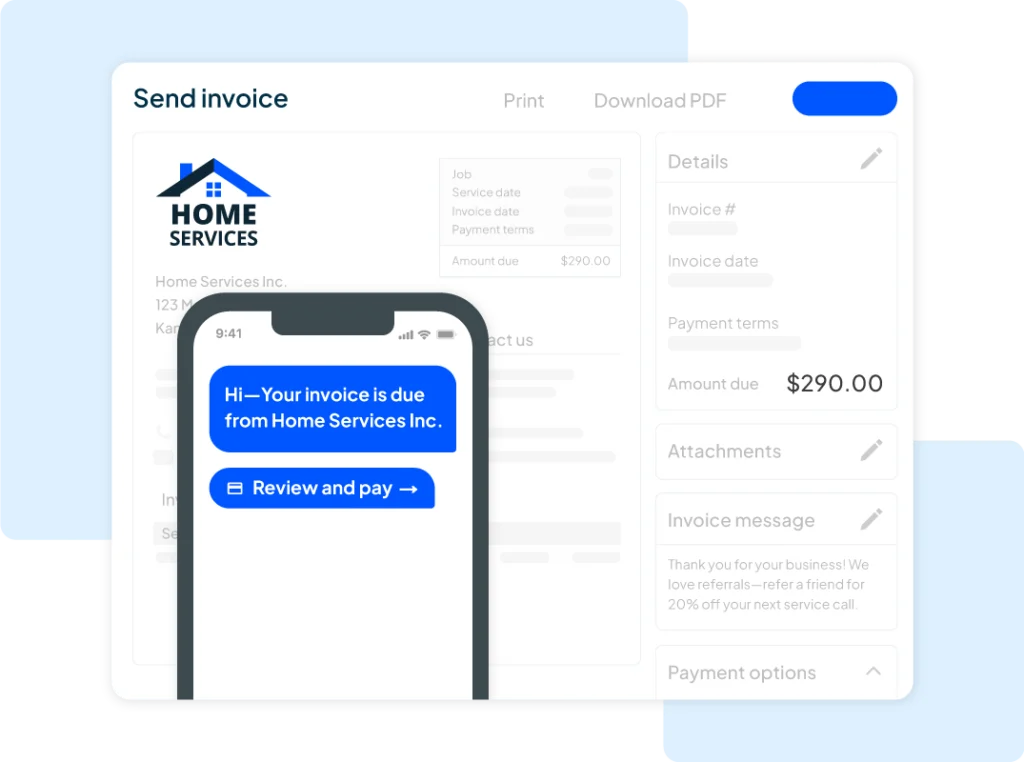Want to win more jobs with less effort?
Grow your business and send quick quotes with our home service software.

You’ve got the hustle mentality. You’ve got the skills. But you’re short on experience…and cash for a startup. So, how do you start a service business?
Simple: pick a smart service, keep costs lean, and start solving real problems. No fluff. No MBA required.
And right now? Your timing couldn’t be better.
Home service industries are booming, driven by aging homes, busy lifestyles, and a massive shift toward convenience. In fact, 76% of U.S. homeowners outsource at least one service every year. That means there’s real, growing demand and a clear opportunity for new pros to carve out a niche.
Even better? Most of these businesses don’t need fancy storefronts or big investments. Just some basic gear, a reliable ride, and a whole lot of hustle.
Learn How to Launch a Service-Based Business
- Starting a Service Business with No Money or Experience? Here's What to Do
- How Much Does It Cost to Start a Service-Based Business?
- Best Service Business Ideas That Are Profitable
- Easy Service Businesses to Start If You’re Getting Your Feet Wet
- 8 Easy Steps to Starting Your Own Service Business
- What to Know Before You Start a Service Business
- Pro Tip: Make It Easier on Yourself with Service Software
- Ready to Go from Hustle to Business Owner?
Starting a Service Business with No Money or Experience? Here’s What to Do
Starting a service business without money or experience is entirely doable with the right strategy.
Begin by learning on the job. Start with services that don’t need licenses, like lawn care or car detailing. Or shadow a local pro in a more specialized trade, like plumbing or HVAC.
Once you get the hang of things, start offering services to friends, neighbors, or family members. This way, you can build confidence, hone your skills, and gather the testimonials you’ll need to build your business.
In the early days of your business, leverage free tools to get your name out there. Market on Facebook groups, Craigslist, and Nextdoor. Ask friends and family to refer you to people they know.
So, you’ve got your service picked out, and you’re starting to spread the word. Now let’s talk money: what kind of budget are we really talking about?
How Much Does It Cost to Start a Service-Based Business?
Exact startup costs will vary based on the type of business you choose, but for the most part, you can launch a home service business for $1,000 to $5,000. If you need more specialized tools, you might pay more.
| Startup Item | Estimated Cost |
| Basic tools and equipment | $500-$3,000 |
| Insurance and licensing | $300-$1,200 |
| Marketing materials | $50-$300 |
| Website and domain setup | $50-$150 |
Pro Tip: Think lean. Only buy what you need. Once cash flow improves, upsell premium services and invest in the high-quality or specialized equipment you’ve had your eye on.
Best Service Business Ideas That Are Profitable
There’s no shortage of home service business ideas that can help you generate serious cash flow. Of course, not all service businesses are created equal. If you want to build fast and profitably, focus on services that check these boxes:
- High repeat or seasonal demand: Think HVAC tune-ups, pest control, and lawn care. Customers need them again and again.
- Low customer acquisition cost: Word of mouth, referrals, and neighborhood platforms like Nextdoor make it easy to get leads without spending big on ads.
- High labor efficiency: These services are short jobs with strong margins. The faster you finish, the more money you make per hour.
The goal is to find the sweet spot between the trio. These professional services are in demand, relatively easy to start, and packed with growth potential:
| Business Type | Revenue Potential (Annual) | Key Drivers |
| Mobile Car Detailing | $40,000 – $120,000+ | Low overhead, repeat customers, upselling (ceramic coating, interior protection), easy to market locally. |
| Cleaning Services | $36,000–$100,000 (first year) | Recurring contracts, low startup costs |
| Pest Control | $200+ per job | Health concerns, seasonal demand |
| Landscaping | $120+ per job | Outdoor living trends, commercial contracts. $100 billion industry by 2028 |
| Pressure Washing | $50,000 – $150,000+ | Low equipment costs, high demand for curb appeal. $390M+ industry (2024) |
| Gutter Cleaning & Repair | $30,000 – $100,000+ | High demand, minimal tools required, low competition, opportunity to upsell gutter guards or maintenance plans. |
| Junk Removal Services | $35,000 – $90,000+ | Rising trend (especially among families and remote workers), low to no equipment. |
Easy Service Businesses to Start If You’re Getting Your Feet Wet

You don’t need a license, trade certification, or years of industry know-how to get started. These service businesses are perfect for first-timers: they’re low-cost, low-risk, and work in just about every neighborhood. You can launch each one of these with basic tools, a little practice, and smart local marketing:
- Mobile car detailing
- Lawn care or seasonal leaf cleanup
- Handyman tasks (basic repairs, furniture assembly)
- Trash bin cleaning services
- Junk removal
- Holiday light installation (recurring annually)
If you’re unsure which to pick, look at what’s already in demand in your area. Ask neighbors, surf Craigslist, or browse Nextdoor to spot the gaps.
8 Easy Steps to Starting Your Own Service Business
1. Pick a Profitable, In-Demand Service
First, figure out what problem you’re going to solve. Look around your neighborhood. What’s in demand? What do people need? Think home maintenance, seasonal yard work, or services aging homeowners might need regularly.
During your quest to find your niche, take a minute to research locally underserved gaps. A quick scan of Google Maps, Yelp, and Facebook Marketplace can reveal gaps, like no one offering gutter cleaning in your zip code.
If you find more than one potential avenue, choose the one you think would be best. Avoid trying to serve everyone by covering all of the gaps. It’s better to be the go-to person for one specific service (like pressure washing) than to offer ten services poorly.
2. Map Out Your Business Plan
Once you identify your niche, build your business model around solving real problems. Start by defining what specific service you can offer reliably. Then, outline your Unique Selling Proposition (what makes you different?), long-term goals, and how you’ll reach them. This is your roadmap to launching a successful business.
While you’re at it, estimate your revenue, expenses, and break-even point. Make sure you factor in all of your startup costs, including basic tools, transportation, and any necessary permits or licenses.
And don’t forget your marketing strategy. This is a big part of success, especially for a home service business. If people don’t know you exist, they won’t book you. So, will you rely on word of mouth, social media, paid ads, or all of the above? Iron out the details on how you’ll reach your target audience and convert leads into paying clients.
3. Get Your Finances in Order
The financial side of a startup can be scary, but it’s a necessary component to contend with. Figure out how you’ll fund your launch. Some businesses don’t require much capital to get started and might be launchable with what you have in savings. Others might require a small business loan or line of credit to get off the ground.
Either way, work out the kinks in your financial strategy. Open a separate bank account to keep your personal transactions separate from your business ones. This will help you stay organized and make tax time much easier.
4. Make It Official
Now, it’s time to choose your legal structure. While some states may allow you to operate without a formal business structure for certain services, there’s a good chance you’ll need to establish one. Your options include:
- Sole proprietorship
- LLC
- S Corporation
The one you choose makes a huge impact on everything from taxes and liability to your overall business management, so choose wisely. If you’re unsure what business structure is required, if any, check your city or county rules. Depending on what you offer, you might need specific business licenses, certifications, or even industry-specific permits.
Register your business name, too. It protects your brand, builds trust, and gets you listed on platforms like Google and Yelp.
5. Protect Your Business From Day One
Regardless of what services you offer, you’ll need business insurance. While it’s an extra cost to contend with, the monthly payment is a small price to pay in exchange for peace of mind and liability protection if something goes wrong on the job.
In addition to insurance, make sure you have all of your paperwork in order. This way, if a discrepancy or dispute arises, you’ll have a paper trail. Store contracts, receipts, and customer notes in one easily accessible place. Usually, this is most manageable with a home service CRM that lets you handle quotes, invoices, and payments all in one place.
6. Use a Simple Pricing System
Decide on a pricing model. For simplicity, you can start with flat fees per job. This model is easy for customers to understand, especially for common services like window washing or appliance repair.
Make sure you price your services competitively. Check out what local competitors are doing and price accordingly, but don’t undercut them by too much, if at all. You’re not trying to race to the bottom, you’re trying to show value.
Don’t forget to account for time, travel, and materials in your pricing setup. Use a cost-plus model at first, then adjust as you gain experience.
7. Focus on Spreading the Word Quickly
Now, turn your focus to your marketing game. You don’t need a big ad budget, but you do need smart tactics. Start with free tools and online communities like Facebook groups, Nextdoor, and a Google Business profile.
Better yet, do all three. Get online fast. Make sure your city knows your business exists. Even just a basic Google Business Profile or website showcasing your services, pricing, and contact information can go a long way.
If you’re up for it, create a social media profile, too. Focus on whatever your target audience is most likely to use, whether that’s TikTok, Instagram, or Facebook.
Put in effort with face-to-face interactions, too. Build local connections. Talk to neighbors, join small business networking groups, or partner with complementary businesses. For example, you might partner with a real estate agent or contractor who may refer clients your way.
8. Sharpen Your Skills and Systems
Things constantly evolve in home service industries, and there’s always something new to learn. So, never stop learning.
Stay up to date on the latest techniques and trends to keep your services competitive. Surround yourself with experienced people, like a mentor who’s been in your shoes or a successful service business owner with an online presence. There’s no need to reinvent the wheel here.
And when you’re ready, hire help. Even just a part-time assistant or skilled subcontractor can free up your time, giving you space to focus on higher-value work and overall business growth.
9. Focus on Long-Term Growth
Once you’ve built a steady business, look for easy ways to expand. You might add a few complementary services to your existing offer (think gutter guard installs on top of a gutter cleaning package).
Track metrics to see which packages perform best and adjust accordingly. Review which jobs are most profitable, where your best leads come from, and what slows you down. Use those insights to tweak your operations over time. This doesn’t happen overnight, but small adjustments over time can set you up for long-term success.
What to Know Before You Start a Service Business
Starting a service business is one of the most accessible paths to entrepreneurship, but it’s still real work. The entry barrier is low, but success takes effort, consistency, and grit.
Here are a few hard-won truths most new pros learn early on:
- Expect hard work and odd hours. You’ll be the labor and the boss, especially early on.
- Show up and follow through. Customers value reliability more than low prices.
- Focus on one service first. Do it well before adding more.
- Every potential customer is a referral opportunity. Impress them.
- This takes time. You won’t get rich fast, but you can get a steady income fast.
Get In Touch: 858-842-5746
Let us earn your trust
On average, Pros increase monthly revenue generated through Housecall Pro by 35% after their first year.
See plan options and feature breakdown on our pricing page.
Pro Tip: Make It Easier on Yourself with Service Software

Even with a basic side hustle, running things on paper gets messy fast. So, make it easier on yourself by investing in service business software, like Housecall Pro. This way, you can:
- Use scheduling tools to stay booked without overbooking.
- Quote and invoice customers digitally so you look professional and get paid faster.
- Track customers, jobs, and payments in one place—especially helpful when you start scaling.
“I absolutely love how deep I can dive into my business with Housecall Pro and how easy it is to see metrics. It allows me to see what areas are hot, what services are making money at a certain time, and where to concentrate our time and our funds.” – Michael Rowley, Owner, Corona Junk Removal & Property Maintenance LLC
Ready to Go from Hustle to Business Owner?
You don’t need a fancy degree or a bottomless bank account to start a service business. Just pick a smart niche, solve real problems, and stay consistent. With the right mindset (and a good set of tools), you can turn your skills into serious income. The path to profit starts with that first job.
And when you’re ready to streamline everything, from scheduling to payments to customer follow-ups, Housecall Pro can help you run it all in one place. Start small. Think big. Try Housecall Pro free and build a business that works as hard as you do.






